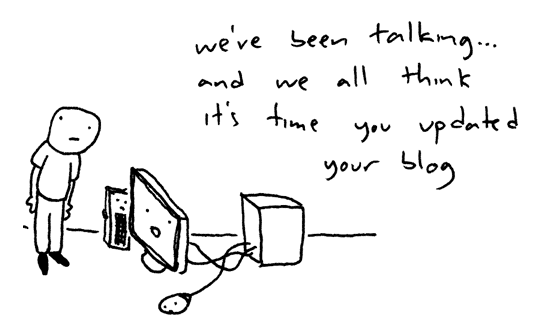 |
| Seems about right. |
It is indeed time to get back to blogging. No excuses and pledges to do better. Let the blogging do the talking.
Ch-Ch-Changes...

I found out towards the end of last school year that my assignment would be a little different than what I had grown accustomed to. On one hand, the opportunity to shake things up and try something new can be exciting and, from my own point of view, gives me the chance to experience the enthusiasm and energy that drove me in the early days of my career.
On the other hand, new courses also means that I would need to spend more time over the summer preparing lessons and materials that I didn't necessarily have. Quite a bit more time, actually.
I had taught Humanities 8 for the past four years and was really starting to think that I was getting things figured out. I was feeling very comfortable with the material and was more willing and able to explore new ideas. I often found myself thinking about how I could use and revisit ideas in the future and make them even better for future classes. More importantly, though, I was able to work with some of the best teachers I have had the privilege of getting to know. I was a Middle School teacher and I loved it! Oh sure, I had difficult and frustrating days, but my place in the school had truly become a part of me.
And then everything changed.
Instead of the safety of Humanities, I would be returning to a revamped and reorganized Grade 9 community with my focus to be on Social Studies. To further sweeten the pot I was also given a few sections of Film Studies (Yay!), and some Social 20-1 (Grade 11). The biggest difference, though, was a chance to help establish a brand new course that hadn't been offered at our school before: Media Literacy.
Hearing this back in late May raised a lot of questions... What is Media Literacy? Why do students need to take it? How are we going to grade this? How can we make this meaningful. I didn't always feel like I had a lot of direction about where I should be headed along with other colleagues on the team. And that's certainly not meant to be a criticism... I think a lot of us were in the same boat trying to work out how all the changes would fit together. If I'm being honest, we're still trying to figure some of these things out. However, I'm definitely feeling more comfortable about the broad direction of where we are heading... much more so than I did back in May and June. I even have another blog set up where those of us working with Media Literacy can share some of our thoughts on what we are learning this year.
I certainly don't want to fill this post with too many ramblings but I will also say that a huge part of our approach this year will revolve around the principles of the Collaborative Response Model or CRM. I'm hoping to be able to share some of the successes (and failures) as I work to use this more regularly in my own practice.
 |
| Just a little summer reading... |
More to come...
Woo-oo!!
One of my absolute favorite shows as a kid was Ducktales. I guess it really embodied the sense of adventure that I found myself drawn to throughout the pop-culture I was immersed in. I'm a sucker for reboots and many efforts to tap into the nostalgia I still have for my early years (looking at you, Classic SNES). While it's true that many promises have fallen flat over the years, I can't help but be impressed over just how well Disney captured the feeling of the original show. And improved upon it.
I watched the first episode with my wife and kids and I couldn't help but notice just how much everyone enjoyed it: Mrs. Thompson and I because it tapped into our love of the first and kept going with it, and my boys because it brought something so new and surprisingly fresh.
I'm very much looking forward to solving mystery and rewriting history with this new chapter.
Cheers!
~Mr.T



















